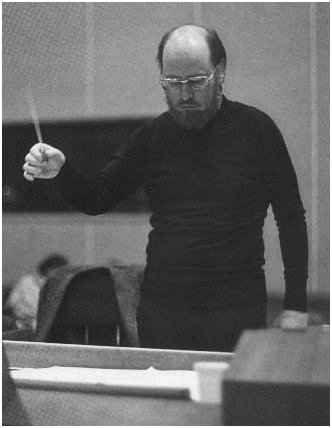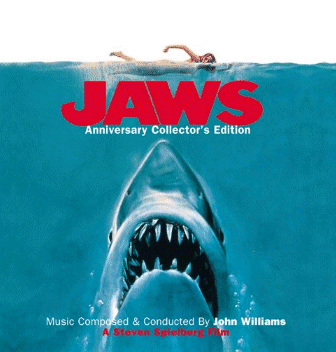Track Listing
1. Main Title and First Victim ** (3:30)
2. The Empty Raft * (1:23)
3. The Pier Incident * (2:22)
4. The Shark Cage Fugue (2:00)
5. Shark Attack * + (1:18)
6. Ben Gardner's Boat (3:31)
7. Montage (1:31)
8. Father and Son * + (3:43)
9. Into the Estuary * (2:51)
10. Out to Sea (2:58)
11. Man Against Beast (5:34)
12. Quint's Tale (2:41)
13. Brody Panics * (1:10)
14. Barrel Off Starboard * (1:31)
15. The Great Shark Chase ** + (3:28)
16. Three Barrels Under * + (2:05)
17. Between Attacks * (2:06)
18. The Shark Approaches ** (2:41)
19. Blown to Bits (3:03)
20. End Titles (1:52)
* Previously unreleased
** Includes unreleased music
+ Includes music not used in the film
Liner Notes
To this day I think that John's score was clearly
responsible for half the success of the film.
Steven Spielberg, Director
When I first saw Jaws, it was clear to me that
it would require an action/adventure score. The film was very different from The Sugarland
Express. For Jaws, I imagined something big and operatic, something very theatrical. Most
of the discussions I had with Steven at that point were about the shark. The challenge was
to find a way to characterize something that’s under water with music rather than
with sound effects. These low thumping notes were the result. I thought that altering the
speed and volume of the theme, from very slow to very fast, from very soft to very loud,
would indicate the mindless attacks of the shark. Steven was a bit sceptical, but when the
orchestra performed the piece, it worked better than we had anticipated. Today, at
concerts, if I just play two notes of the Jaws theme, people immediately recognize it. I
think it's wonderful when these kinds of musical associations are created and when they
make an impression on an audience.
There were many opportunities in the movie to advertize the shark with music, but also
others, such as the scene where kids have put on a fake fin to scare people, where we
don't have any music. Here, the audience experiences a sense of absence, because we've
conditioned them to expect the predator only when they hear its theme. Then we go a step
further for the scenes with the Orca — where we know the shark is there — but
his attacks come out of silence, to create further surprise.

John Williams (1975)
Jaws had several other musical requirements, such as the "montage," a
classically-styled piece for the arrival of the tourists on the island for the Fourth of
July; the action pieces taking place at sea with the Orca and the three heroes chasing the
shark; a very dark composition for "Quint's Tale"; the building of the cage; the
climax; and finally the "End Titles" music. But my own favorite cue in Jaws has
always been the barrel chase sequence, where the shark approaches the boat and the three
heroes think they have captured it. The music accelerates and becomes very exciting and
heroic. Suddenly, as the shark overpowers them and eventually escapes, the music deflates
and ends with a little sea shanty called "Spanish Lady." The score musically
illustrates and punctuates this entire dramatic outline.
Jaws certainly was a landmark in my career. I
had won the Academy Award for Fiddler on the Roof, for which I did all the arrangements,
underscoring and conducting. But Jaws was the first Oscar I received for my own music, and
that was a significant moment for me. Jaws also firmly established my relationship with
Steven Spielberg. Working with Steven has been a delight. He has the most wonderful
personality and his goal is always to entertain people while also trying to improve the
world. He sees problems as opportunities for solutions. It has been a great privilege to
be associated with him.
John Williams
|

